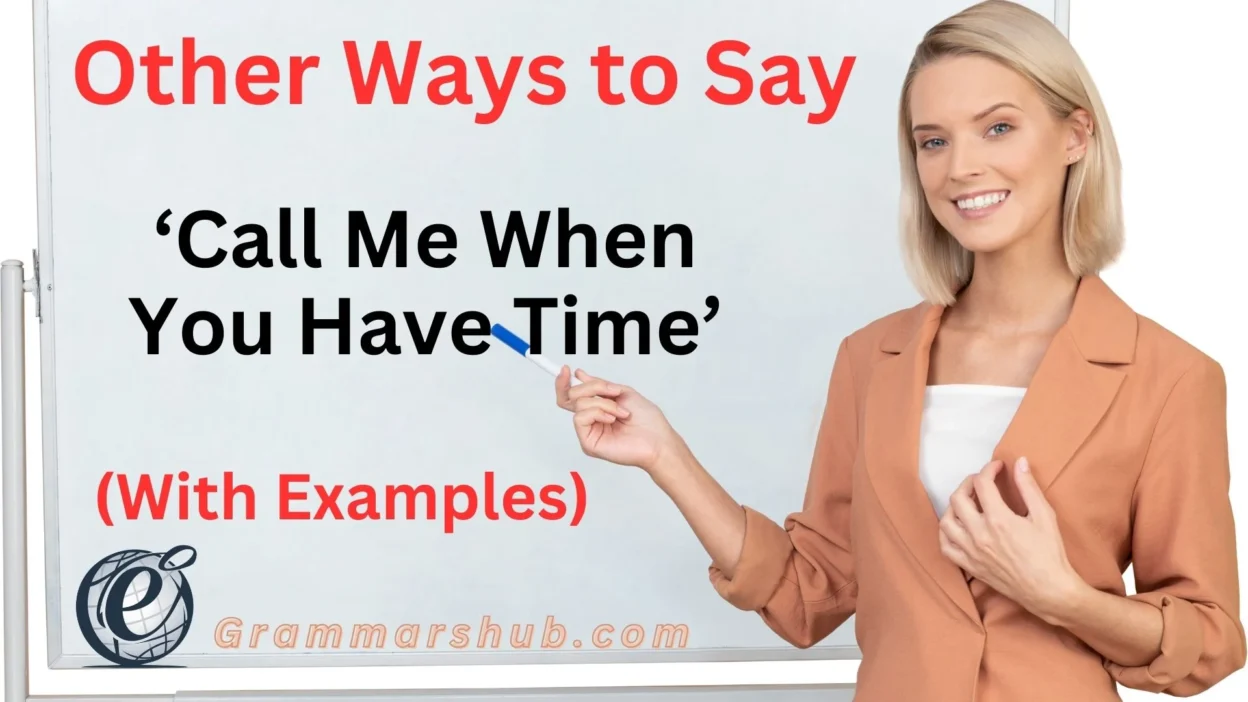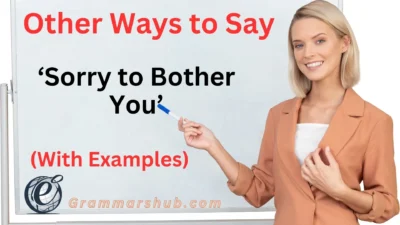Sometimes, finding the right words to express your needs can be tricky, especially when you want to communicate care, warmth, and thoughtfulness. A simple phrase like “Call me when you have time” may seem straightforward, but there are countless other ways to convey the same message with a more personal touch.
These alternatives allow you to show that you understand the other person’s busy schedule, and that you respect their time, while also gently requesting to connect when they can. Whether it’s a professional or casual context, the way you ask can make a world of difference in how the message is received.
What Does “Call Me When You Have Time” Mean?
“Call me when you have time” is a friendly and considerate way of letting someone know you would like to speak to them, but you understand that their schedule might be tight.
It’s a way of offering space, while still expressing the desire for a conversation or connection. The tone of the phrase is generally casual and respectful, but it can sound a little impersonal or mechanical in some situations.
Is It Professional/Polite to Say “Call Me When You Have Time”?
In many contexts, yes, it is polite to say “Call me when you have time.” It acknowledges the other person’s likely busy schedule and leaves room for them to reach out when it’s convenient for them. However, depending on the situation, you may want to refine or tailor the phrase to make it sound more empathetic or professional, especially in formal or business-related scenarios.
Advantages and Disadvantages of “Call Me When You Have Time”
Advantages:
- It’s respectful of the other person’s time.
- It gives them flexibility in choosing when to connect.
- It conveys that you care without pressuring them.
Disadvantages:
- It may sound a little generic or impersonal at times.
- It doesn’t necessarily convey urgency if that’s required.
- In certain situations, it might be perceived as too indirect.
1. “Let’s Catch Up When You’re Free”
Meaning: A warm invitation to talk at a time that’s convenient for the other person.
Detailed Explanation: This phrase makes it clear that you’re not in a rush, but still want to connect when it’s possible for them.
Scenario Example: “I know you’ve been swamped with work lately—let’s catch up when you’re free.”
Best Use: Casual settings with friends or colleagues.
Tone: Friendly, relaxed, and considerate.
2. “Give Me a Ring When You Have a Moment”
Meaning: A lighthearted way to ask someone to call you when they have some free time.
Detailed Explanation: “Give me a ring” is an informal phrase that adds a touch of warmth and charm to your request.
Scenario Example: “Hey, I’d love to hear your thoughts on this—give me a ring when you have a moment.”
Best Use: Informal settings or with people you’re comfortable with.
Tone: Warm, casual, and friendly.
3. “Whenever You Get a Chance, Let Me Know”
Meaning: Politely asking someone to reach out when their schedule permits.
Detailed Explanation: This phrasing shows that you’re sensitive to their time constraints.
Scenario Example: “Whenever you get a chance, let me know what you think about the proposal.”
Best Use: Work or business-related situations.
Tone: Professional, respectful, and patient.
4. “Call Me When Things Settle Down for You”
Meaning: Gently suggesting a conversation once the other person’s schedule eases up.
Detailed Explanation: This shows empathy for the other person’s situation and an understanding that their time may be limited.
Scenario Example: “I know you’ve had a lot on your plate recently—call me when things settle down for you.”
Best Use: When talking to someone dealing with a busy or stressful period.
Tone: Empathetic, caring, and supportive.
5. “Whenever You Have a Breather, Let’s Talk”
Meaning: A lighthearted way of suggesting that the other person reach out when they have a break.
Detailed Explanation: It suggests a sense of ease, letting the other person know they don’t have to rush.
Scenario Example: “Whenever you have a breather, let’s talk about those new ideas.”
Best Use: Casual conversations, especially with friends or colleagues.
Tone: Friendly, relaxed, and understanding.
6. “Reach Out When You Have Some Time to Chat”
Meaning: A polite request for the other person to contact you when they’re available.
Detailed Explanation: This is straightforward and slightly formal, making it appropriate for work-related interactions.
Scenario Example: “I’d love to go over this with you—reach out when you have some time to chat.”
Best Use: Professional, business, or formal contexts.
Tone: Polite, neutral, and respectful.
7. “Drop Me a Call When You’re Free”
Meaning: A simple and direct way of asking someone to call you at their convenience.
Detailed Explanation: “Drop me a call” is casual and approachable, suggesting that the conversation can happen whenever it’s convenient.
Scenario Example: “I’d love to catch up soon—drop me a call when you’re free.”
Best Use: Friendly, informal settings.
Tone: Casual, upbeat, and easygoing.
8. “Ping Me When You Have a Moment”
Meaning: A modern and tech-savvy way to suggest they message or call you when it’s a good time for them.
Detailed Explanation: “Ping me” comes from the digital world, referring to a brief message or notification, making it a great option for quick communication.
Scenario Example: “I have a quick question—ping me when you have a moment.”
Best Use: Text, email, or digital communication.
Tone: Informal, fast-paced, and modern.
9. “Let Me Know When You Can Talk”
Meaning: A polite, non-urgent way to ask someone to reach out when they have time.
Detailed Explanation: It’s respectful and flexible, without imposing any time constraints.
Scenario Example: “Let me know when you can talk, I need your input on something.”
Best Use: Professional and casual settings.
Tone: Polite, flexible, and considerate.
10. “Hit Me Up When You’re Free”
Meaning: A relaxed, informal request for the other person to contact you when they have time.
Detailed Explanation: “Hit me up” is an expression often used in casual communication, especially among younger people or close friends.
Scenario Example: “We should catch up soon—hit me up when you’re free!”
Best Use: Informal settings with friends or people you know well.
Tone: Laid-back, friendly, and fun.
11. “Give Me a Shout When You’re Available”
Meaning: A friendly and informal way to ask someone to call you when they have time.
Detailed Explanation: This phrase is commonly used in casual conversations and has a relaxed, easygoing feel. It doesn’t create pressure but still signals that you’d like to talk.
Scenario Example: “Hey, I’d love to go over the plans—give me a shout when you’re available!”
Best Use: Casual chats with friends or colleagues.
Tone: Informal, friendly, and upbeat.
12. “Let’s Connect When You Have a Minute”
Meaning: A professional and polished way to ask someone to reach out when they’re free.
Detailed Explanation: The phrase “let’s connect” sounds business-friendly and appropriate for professional settings while still being warm.
Scenario Example: “Let’s connect when you have a minute—I have some quick updates for you.”
Best Use: Business, networking, or workplace communication.
Tone: Professional, respectful, and engaging.
13. “When You Get a Spare Moment, Let’s Talk”
Meaning: A polite way to suggest a conversation without making it feel urgent.
Detailed Explanation: This phrase acknowledges that the person might be busy but leaves the door open for a conversation at their convenience.
Scenario Example: “When you get a spare moment, let’s talk about your ideas for the project.”
Best Use: Work settings or with acquaintances.
Tone: Polite, neutral, and understanding.
14. “No Rush, Just Call Me When You Can”
Meaning: A considerate way to let someone know they can take their time before calling.
Detailed Explanation: This phrase reassures the person that there’s no urgency, making them feel at ease about when to respond.
Scenario Example: “No rush, just call me when you can—I’d love to catch up.”
Best Use: Personal and friendly conversations.
Tone: Warm, understanding, and easygoing.
15. “Reach Out Whenever You’re Ready”
Meaning: A flexible way to let the other person choose when to contact you.
Detailed Explanation: This phrase gives them complete freedom, making them feel comfortable about the timing of their response.
Scenario Example: “I’d love to discuss this further—reach out whenever you’re ready.”
Best Use: Conversations where you don’t want to pressure the other person.
Tone: Supportive, patient, and reassuring.
16. “Drop Me a Line When You Have a Chance”
Meaning: A simple and slightly old-fashioned way to ask someone to get in touch.
Detailed Explanation: “Drop me a line” can refer to a phone call, text, or even an email, making it a versatile phrase.
Scenario Example: “Drop me a line when you have a chance—I’d love to hear from you.”
Best Use: Friendly, personal, or even professional emails/messages.
Tone: Polite, thoughtful, and adaptable.
17. “I’d Love to Hear from You When You’re Free”
Meaning: A warm and personal way to let someone know you’re looking forward to speaking with them.
Detailed Explanation: This phrase emphasizes the desire to hear from the other person while still respecting their time.
Scenario Example: “I’d love to hear from you when you’re free—it’s been too long!”
Best Use: Personal conversations, especially with family or close friends.
Tone: Warm, affectionate, and inviting.
18. “Whenever It Works for You, Let’s Talk”
Meaning: A relaxed and flexible way to suggest a conversation.
Detailed Explanation: It shows that you’re giving the other person full control over when they reach out.
Scenario Example: “Whenever it works for you, let’s talk about the event details.”
Best Use: Both casual and professional settings.
Tone: Considerate, easygoing, and respectful.
19. “Call Me Whenever You Find a Free Moment”
Meaning: A gentle request to be contacted when the other person finds time.
Detailed Explanation: This phrasing recognizes their busy schedule while keeping the request open-ended.
Scenario Example: “Call me whenever you find a free moment—I’d love to get your thoughts on this.”
Best Use: Polite and professional discussions.
Tone: Thoughtful, flexible, and understanding.
20. “Touch Base When You Can”
Meaning: A common business term for checking in with someone.
Detailed Explanation: “Touch base” is often used in work settings to mean having a brief discussion or update.
Scenario Example: “Let’s touch base when you can—I have some quick updates for you.”
Best Use: Business or professional settings.
Tone: Professional, clear, and efficient.
21. “Feel Free to Call Me Whenever”
Meaning: A laid-back way to tell someone they can call anytime.
Detailed Explanation: This phrase removes any pressure, making the conversation feel open and relaxed.
Scenario Example: “Feel free to call me whenever—it doesn’t have to be today.”
Best Use: Casual and personal conversations.
Tone: Friendly, relaxed, and inviting.
22. “Hit Me Up When You’re Around”
Meaning: A very informal way to ask someone to contact you when they’re free.
Detailed Explanation: “Hit me up” is a casual phrase often used among friends and younger people.
Scenario Example: “Hit me up when you’re around—I’d love to catch up!”
Best Use: Friends, social settings.
Tone: Playful, modern, and informal.
23. “Just Let Me Know When You’re Available”
Meaning: A polite and professional way to ask someone to call at their convenience.
Detailed Explanation: It puts the responsibility on them but in a respectful way.
Scenario Example: “Just let me know when you’re available, and we’ll set up a time to chat.”
Best Use: Work or polite conversations.
Tone: Respectful, neutral, and flexible.
24. “Give Me a Quick Call When You Have a Second”
Meaning: A request for a short phone call whenever they can manage.
Detailed Explanation: The phrase suggests that the call will be brief, which can make the request feel easier to fulfill.
Scenario Example: “Give me a quick call when you have a second—I need to ask you something.”
Best Use: Quick, informal business or personal conversations.
Tone: Friendly, concise, and low-pressure.
25. “Let Me Know When You’re Good to Talk”
Meaning: A casual way to ask someone to reach out when they’re available.
Detailed Explanation: This phrase ensures that the other person feels comfortable deciding the right time to call.
Scenario Example: “Let me know when you’re good to talk—I’d love to catch up!”
Best Use: Casual and friendly conversations.
Tone: Relaxed, warm, and easygoing.
26. “Call Me When You Get a Free Minute”
Meaning: A polite way to ask for a call when it fits their schedule.
Detailed Explanation: The phrase acknowledges their potential busyness while making the request sound effortless.
Scenario Example: “Call me when you get a free minute—I have a quick update for you.”
Best Use: Both casual and professional settings.
Tone: Considerate, light, and friendly.
27. “Whenever You’re Up for a Chat, Let Me Know”
Meaning: A warm and flexible way to invite a conversation.
Detailed Explanation: This makes it clear that the person should only call when they genuinely want to.
Scenario Example: “Whenever you’re up for a chat, let me know—I’d love to hear how things are going.”
Best Use: Friendly conversations with people you care about.
Tone: Gentle, understanding, and open-ended.
28. “Shoot Me a Message When You’re Free to Talk”
Meaning: A modern way to request a conversation without pressure.
Detailed Explanation: This phrase allows the other person to choose how they respond—via text or call.
Scenario Example: “Shoot me a message when you’re free to talk. No rush at all!”
Best Use: Digital communication via text or messaging apps.
Tone: Casual, flexible, and tech-friendly.
29. “Drop Me a Call Whenever You’re Ready”
Meaning: A soft and friendly way to suggest a call when they have time.
Detailed Explanation: The phrase keeps the request casual while still leaving the door open for a conversation.
Scenario Example: “Drop me a call whenever you’re ready—we have some catching up to do!”
Best Use: Informal, friendly discussions.
Tone: Laid-back, warm, and inviting.
30. “Give Me a Buzz When You’re Available”
Meaning: A playful and informal way of asking for a call.
Detailed Explanation: “Give me a buzz” is an old-school but fun way to say “call me.”
Scenario Example: “Give me a buzz when you’re available—I’ve got some exciting news!”
Best Use: Friends and casual conversations.
Tone: Lighthearted, friendly, and engaging.
31. “Whenever You Have a Free Second, Let’s Talk”
Meaning: A non-urgent way to request a call when they get the chance.
Detailed Explanation: This phrase communicates patience and consideration for their schedule.
Scenario Example: “Whenever you have a free second, let’s talk about your weekend plans!”
Best Use: Lighthearted, social settings.
Tone: Friendly, relaxed, and adaptable.
32. “No Rush, Just Give Me a Call When It Works for You”
Meaning: A reassuring and considerate way to let someone know you’d love to hear from them.
Detailed Explanation: This removes any sense of urgency while keeping the request open-ended.
Scenario Example: “No rush, just give me a call when it works for you—I’m always happy to chat.”
Best Use: When you don’t want the person to feel pressured.
Tone: Thoughtful, patient, and friendly.
33. “Let’s Talk When It’s Convenient for You”
Meaning: A polite and professional way to request a call.
Detailed Explanation: This phrase emphasizes that you respect their time and schedule.
Scenario Example: “Let’s talk when it’s convenient for you—I’d love to go over the details.”
Best Use: Work and business settings.
Tone: Professional, formal, and courteous.
34. “I’ll Be Around—Call Me When You Have a Moment”
Meaning: A casual way to say that you’re available for a call.
Detailed Explanation: This phrase assures the person that they can call whenever it works for them.
Scenario Example: “I’ll be around—call me when you have a moment to chat!”
Best Use: Friendly or semi-professional conversations.
Tone: Relaxed, inviting, and easygoing.
35. “Catch Me Whenever You’re Free”
Meaning: A flexible and friendly way to suggest a conversation.
Detailed Explanation: This lets the other person know they can call whenever it fits their schedule.
Scenario Example: “Catch me whenever you’re free—I’d love to hear about your trip!”
Best Use: Friends and informal settings.
Tone: Casual, friendly, and laid-back.
Conclusion
The way you ask someone to call you can significantly affect how your message is received. While “Call me when you have time” is polite and direct, it might not always capture the warmth, care, or urgency you want to express. By choosing one of these 35 alternatives, you can tailor your message to fit the situation—whether it’s a professional request, a friendly catch-up, or a thoughtful check-in.
A well-phrased request not only shows respect for the other person’s time but also strengthens your connection with them.




